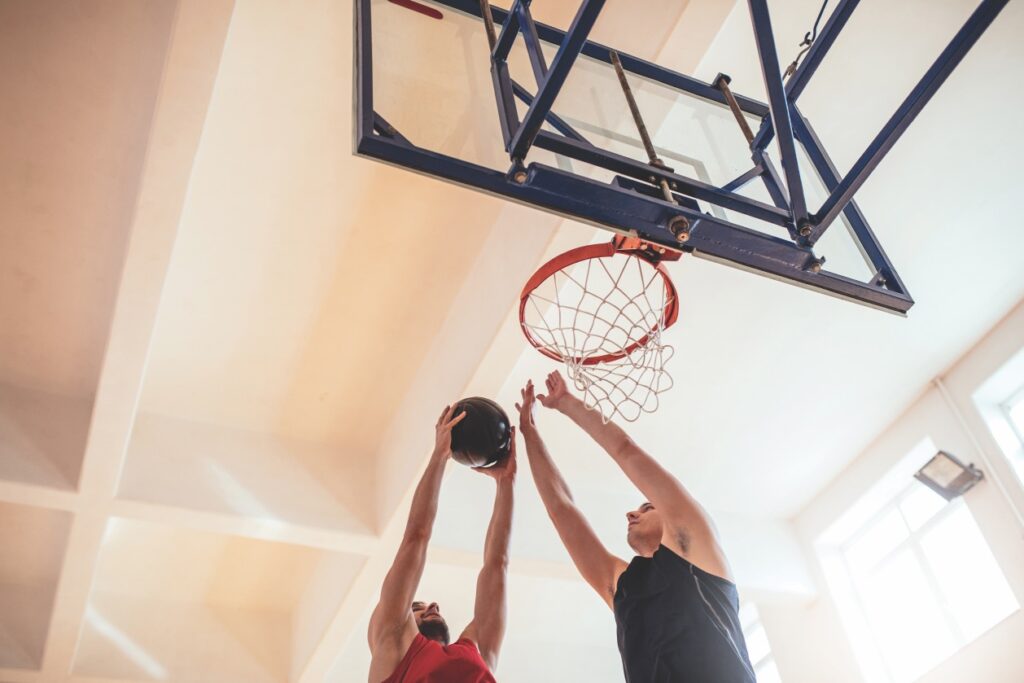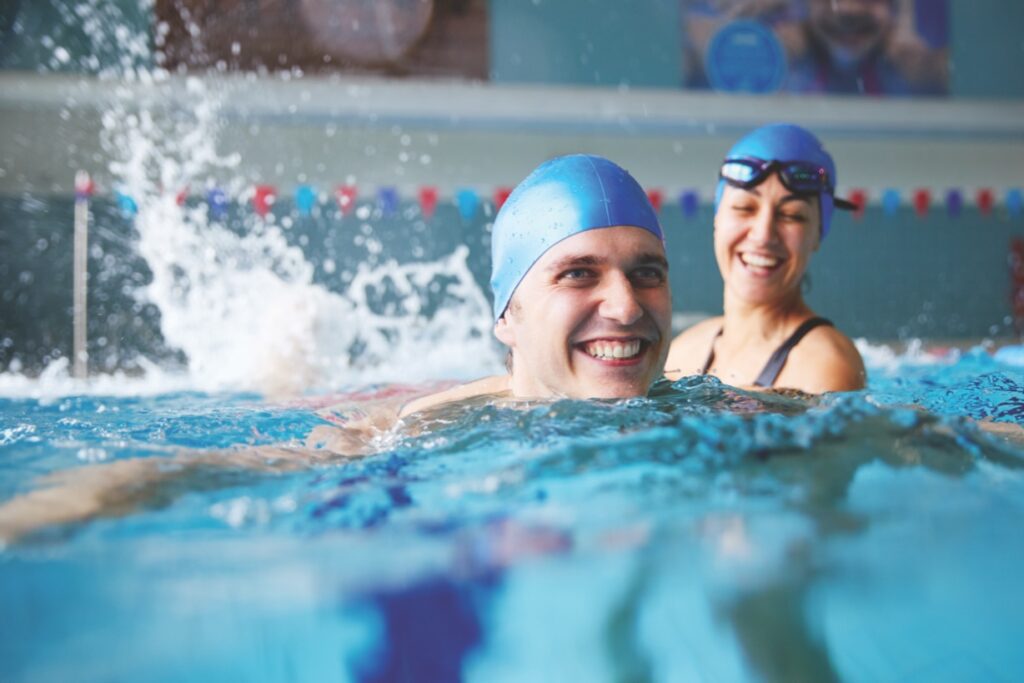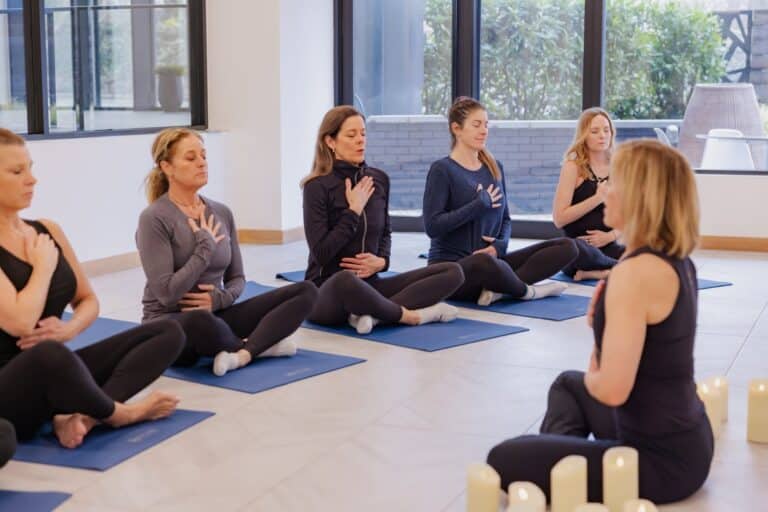Playing a team sport often conjures images of kids in matching jerseys outfitted with the name of a local business or weekends spent at the hockey rink. As adults, we tend to focus on the benefits of team sports for kids and teens. But what about when you’re past Little League age? “Competitive sports aren’t only for elite athletes or young people learning life lessons through participation,” says Kevin Burton, athletic director at Chelsea Piers in Stamford, CT. “They are a lifestyle that adds joy to athletes of all ages and ability levels.” And joy, it turns out, is just one of the many upsides of playing on a sport team as an adult. Here, we dig in to a few of the benefits—plus some tips on what to do if you want to play, but feel slightly intimidated to get back out there.
INCREASED LONGEVITY
The list of positive ways working out can impact your health—reducing stroke, heart attack and Alzheimer’s disease risk, to name a few—is a long one. “Not until the last five years, though, has research looked into the particular benefits of team sports,” says Andrew Wong, MD, a primary care provider and regional medical director for Hartford Healthcare in Westport, CT. “Prior to that, most in the health field erroneously assumed that the more intensive the work out was, the better it was for our health. However, a 2018 study in the Mayo Clinic Proceedings revealed that although all forms of exercise led to life longevity, team sports and sports that required socialization with others, such as soccer, led to, in some cases, up to five times or more longevity benefit versus solitary exercises, such as using an elliptical machine or stationary bike.”

LOWER STRESS LEVELS
“The mental health benefits of sports are vast,” says Sara Whalen Hess, Psy.D., a clinical psychologist in Rye, NY, who, as both an Olympic silver medalist and member of the 1999 championship U.S. Women’s World Cup soccer team, is no stranger to this world. “The reduction of anxiety and depression symptoms are noticeable right away. Our bodies release certain chemicals during exercise that just feel good.” She compares it to a can of soda— shake it and those bubbles have to have somewhere to go. “The same is true of our bodies,” she says. “When we are shaken (stressed), those stress hormones need a release—that’s the exercise and that’s why we feel so much better afterwards.” Both Burton and Jon Ruddock, the adult league director at Chelsea Piers, say they hear from participants in their adult sports league—which includes soccer, volleyball and basketball, along with other competitive activities in tennis, squash, swimming and gymnastics—that reducing stress is one of the reasons for playing. “Many of our participants see the leagues as a way to relive stress and improve their health and fitness while playing a team game,” says Ruddock.

MORE SOCIAL CONNECTIONS
There’s no doubt that participating in a team sport provides adults with a chance to socialize in a way they might not otherwise. “Recent studies are now showing that adults who participate in team sporting activities have lower likelihood of being diagnosed with mental illness,” says Wong. He points to research from Germany, which found that team sport players were less likely to have signs of depression compared to those who participate in individual sports, like cycling. “The belief is that athletes in individual sports play for goal-oriented reasons, and are more likely to internalize failure and become hyper-focused on results, while team sports involve a community and network of players, who report playing sports for fun,” he explains. “Indeed, team sports promote socialization between players by encouraging cooperation and understanding of one another’s strengths and weaknesses, and that working together is essential for winning.” Hess also notes the feeling of connection to others we get when playing sports—and how important this is for our overall health.
A FOCUS ON FUN
“When you are smiling and feeling the positive vibes from your teammates, you have a built-in support system to pursue your specific health goals, such as building muscle, increasing speed, managing diabetes or weight loss,” says Karen M. Sutton, MD, sports medicine surgeon at HSS Stamford. And as Burton mentioned at the onset, there is an inherent joy that comes from playing sports, no matter how old you are. “Personally, sports have been a central component and hugely impactful to my life since I was a child,” he says. “As an adult, it is an outlet where I still have something to train for and look forward to.”
GETTING BACK IN THE GAME
Worried it’s been too long since you’ve played second base in softball or went full-court in a game of hoops? Some advice:
GO FOR IT “One rule of thumb in my private practice is to never let anxiety or worry take something fun from your life,” says Hess. “If the only reason to avoid it is that your mind is telling you you’re not good enough, then push through it. Don’t let annoying mind chatter take something fun out of your life.”
WINNING ISN’T EVERYTHING “The great thing about team sports is that it’s all about coming together, no matter what your individual strength, experience or size is, and finding a way to succeed together,” says Wong. “Team sports, for most of us, is about having fun and getting healthy, rather than being focused on just winning.” He notes that finding a group or league that is welcoming and on the same competitive level as you is a good idea. At Chelsea Piers, for instance, there are teams at various levels, which allows both novices and stronger players to participate, says Ruddock.
BRING A FRIEND. “Better yet, try to get a group of friends or coworkers together to form your own team,” says Wong. “Within a few weeks, you’ll start to notice an improvement in your physical fitness, as well as developing a more positive outlook on life.”





